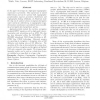119
click to vote
ITP
2010
15 years 6 months ago
2010
CertiCrypt is a general framework to certify the security of cryptographic primitives in the Coq proof assistant. CertiCrypt adopts the code-based paradigm, in which the statement ...
119
Voted
COCO
2007
Springer
15 years 6 months ago
2007
Springer
Current constructions of efficient argument systems combine a short (polynomial size) PCP with a cryptographic hashing technique. We suggest an alternative approach for this probl...
100
click to vote
ICCD
1993
IEEE
15 years 6 months ago
1993
IEEE
In this paper the design of a high-speed cryptographic coprocessor is presented. This coprocessor is named Subterranean and can be used for both cryptographic pseudorandom sequenc...
115
click to vote
FOCS
2002
IEEE
15 years 7 months ago
2002
IEEE
Randomization is vital in cryptography: secret keys should be randomly generated and most cryptographic primitives (e.g., encryption) must be probabilistic. As a bstraction, it is...
128
click to vote
FSTTCS
2003
Springer
15 years 7 months ago
2003
Springer
We prove the Needham-Schroeder-Lowe public-key protocol secure under real, active cryptographic attacks including concurrent protocol runs. This proof is based on an abstract crypt...
114
click to vote
ESORICS
2003
Springer
15 years 7 months ago
2003
Springer
Abstract. Proofs of security protocols typically employ simple abstractions of cryptographic operations, so that large parts of such proofs pendent of cryptographic details. The ty...
115
click to vote
DEXAW
2003
IEEE
15 years 7 months ago
2003
IEEE
This paper presents an open protocol for interoperability across multi-vendor programmable smart cards. It allows exposition of on-card storage and cryptographic services to host ...
129
click to vote
ESORICS
2004
Springer
15 years 7 months ago
2004
Springer
We present the first cryptographically sound security proof of the well-known Otway-Rees protocol. More precisely, we show that the protocol is secure against arbitrary active att...
111
click to vote
IMA
2005
Springer
15 years 8 months ago
2005
Springer
In recent years much research has been devoted to producing formal models of security for cryptographic primitives and to designing schemes that can be proved secure in such models...
100
click to vote
ICALP
2005
Springer
15 years 8 months ago
2005
Springer
In this paper we study the link between formal and cryptographic models for security protocols in the presence of a passive adversary. In contrast to other works, we do not conside...





